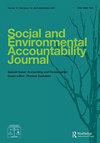管理监管空间:在轻度监管的背景下审视信用社对政府的责任
Q2 Business, Management and Accounting
Social and Environmental Accountability Journal
Pub Date : 2021-07-17
DOI:10.1080/0969160X.2021.1952886
引用次数: 1
摘要
摘要本文探讨了信用合作社如何在印尼监管宽松的背景下管理对政府的问责制。通过与信用合作社管理层的焦点小组讨论和审查信用合作社的年度报告和战略计划,采用涉及个案研究的定性方法,对两个信用合作社进行了审查。调查结果显示,与政府相关的正式合规问责机制很少,信用合作社对这些机制的重视程度也很有限。然而,非正式地,信用合作社以各种战略方式让政府参与进来,以证明问责制和合法性,并寻求政府的支持,从而管理监管空间,以维持一个宽松的监管环境。本文提供了关于信用合作社如何通过积极展示合法性和问责制,采用以合作为主的方式来管理和谈判有限监管空间的见解。考虑到较发达国家的监管框架似乎不太有效,这种方法尤其重要,因为它以涉及四个层次(即合规、行业内的自我监管、与监管机构的接触,以及有选择地挑战被认为不公平或没有帮助的监管)的参与金字塔的形式呈现。它为第三部门内外的其他组织提供了参考,以考虑他们的行动如何应对监管空间,并建设性地塑造监管空间,而不是遵守或逃避。本文章由计算机程序翻译,如有差异,请以英文原文为准。
Managing the Regulatory Space: Examining Credit Union Accountability to Government in a Lightly Regulated Context
ABSTRACT This paper examines how credit unions manage accountability to government in the lightly-regulated context of Indonesia. Adopting a qualitative methodology involving a case study approach, two credit unions are examined, through focus group discussions with credit union management and review of credit unions’ annual reports and strategic plans. Findings reveal few formal compliance-based accountability mechanisms in relation to government, and limited emphasis on these mechanisms by credit unions. However, informally, credit unions involved government in various strategic ways to demonstrate accountability and legitimacy, and seek support from them, thereby managing the regulatory space to maintain a lightly-regulated context. This paper provides insights into how credit unions adopted a predominantly co-operative approach to manage and negotiate a space of limited regulation by actively demonstrating legitimacy and accountability. Presented in the form of an engagement pyramid involving four levels (i.e. compliance, self-regulation within the sector, engaging with regulators, and selectively challenging regulation perceived as unfair or unhelpful), this approach is particularly important given the seemingly less effective regulatory frameworks in more developed countries. It provides a reference for other organisations, both within the third sector and beyond, to consider how their actions might respond to and constructively shape the regulatory space, beyond comply or evade.
求助全文
通过发布文献求助,成功后即可免费获取论文全文。
去求助
来源期刊

Social and Environmental Accountability Journal
Business, Management and Accounting-Accounting
CiteScore
3.90
自引率
0.00%
发文量
16
期刊介绍:
Social and Environmental Accountability Journal (SEAJ) is the official Journal of The Centre for Social and Environmental Accounting Research. It is a predominantly refereed Journal committed to the creation of a new academic literature in the broad field of social, environmental and sustainable development accounting, accountability, reporting and auditing. The Journal provides a forum for a wide range of different forms of academic and academic-related communications whose aim is to balance honesty and scholarly rigour with directness, clarity, policy-relevance and novelty. SEAJ welcomes all contributions that fulfil the criteria of the journal, including empirical papers, review papers and essays, manuscripts reporting or proposing engagement, commentaries and polemics, and reviews of articles or books. A key feature of SEAJ is that papers are shorter than the word length typically anticipated in academic journals in the social sciences. A clearer breakdown of the proposed word length for each type of paper in SEAJ can be found here.
 求助内容:
求助内容: 应助结果提醒方式:
应助结果提醒方式:


